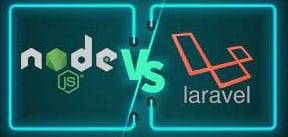There are various programming and scripting languages in the world of web development. These programming and scripting languages are used for web development, mobile application development, web APIs, or any other internet-based facility. Various frameworks are available for developers to take leverage and start their development journey. The special built-in features of these frameworks make the whole development process less time-consuming and provide faster development turnaround time for web applications. Two of such frameworks are Laravel and NodeJS and we’re going to take a look at their pros & cons.
Table of Contents
ToggleLaravel
Laravel is a free, open-source PHP web framework, created by Taylor Otwell. It is used for the development of web applications with the model–view–controller (MVC) architectural pattern and based on Symfony.
Some of the features of Laravel are a modular packaging system with a dedicated dependency manager, different ways for accessing relational databases, utilities that aid in application deployment and maintenance, and its orientation toward syntactic sugar. Laravel is the most popular PHP framework.
Pros
- Great Documentation – Each version of the framework released with appropriate documentation, featuring comprehensive and easy to understand description when it comes to classes, approaches and code types.
- Faster Development Cycle – This one can be a great selling point for most developers. Laravel can noticeably reduce the entire development cycle since the integrations are a lot quicker. If you happen to get stuck, there’s a huge Laravel-user community out there, so the chances of getting all the answers to your questions are pretty good.
- Artisan – Laravel comes with its integrated command-line interface. Artisan allows developers to build skeletal codes. It also controls the database system so developers don’t have to execute routine programming tasks.
- Eloquent ORM – With eloquent ORM, you can have a smooth Active Record implementation to work with the database. In other words, this Laravel feature enables you to create models which have a corresponding table in the database. The ORM hosts built-relationships, meaning that when you change the table then the related data will change too.
- Simplified Email Integration System – With Laravel, you can use drivers for Mandrill, Amazon SES, Sendmail, and others. Emails can be sent both in the cloud and through local services.
Cons
- Slow Development – Laravel’s development is a bit slower as compared to other frameworks.
- Lack of Inbuilt Support – When compared to other frameworks such as Ruby on Rails and Django, Laravel has limited inbuilt support due to it being lightweight. This issue can be resolved though third-party tools.
- Problematic with Certain Upgrades – PHP platforms, in general, have a few issues regarding versions with long-term supports and Laravel sometimes gets critique because of this. Updates may indeed be able to cause minor problems, however, with the proper attention, developers can smooth out the process.
- Weak Composer – Laravel is a new framework and is not as mature as many other frameworks. The composer is not so strong as compared to npm (for node.js) or ruby gems and pip (python).
- Lack of Technical Talents – Laravel may seem simple because of the automated functions it is equipped with. This is misleading. Many developers overestimate their knowledge therefore there are not many highly skilled Laravel experts.
NodeJS
Node.js is an open-source, cross-platform, back-end JavaScript runtime environment that runs on the V8 engine and executes JavaScript code outside a web browser. Node.js lets developers to use JavaScript to write command-line tools and for server-side scripting—running scripts server-side to produce dynamic web page content before the page is sent to the user’s web browser.
Pros
- Easy Scalability – Developers find it easy to scale the applications in horizontal as well as vertical directions. The applications can be scaled horizontally by the addition of additional nodes to the existing system.
- Easy to Learn – Since JavaScript is one of the most popular programming languages, most front-end developers have a good grasp of it. It becomes much easier for them to start using Node.js at the backend. It is easier to learn Node.js and consumes less time to work with it.
- High Performance – Node.js interprets the JavaScript code via Google’s V8 JavaScript engine. This engine complies with JavaScript code directly into the machine code. This makes it easier and faster to implement the code effectively. The speed of the code execution also enhanced by the runtime environment as it supports the non-blocking I/O operations.
- Highly Extensible – Node.js is known to be highly extensible, which means that you can customize and further extend Node.js as per their requirements. You can also make use of JSON to provide the scope for the exchange of data between the web server and the client. It also is facilitated with built-in APIs for developing HTTP, TCP, and DNS etc. servers.
- Large & Active Community – Node.js is blessed to have a large and active community of developers who keep on continuously contributing towards its further development and improvement.
Cons
- Reduced Performance during Heavy Tasks – Node.js falls short at executing heavy CPU-based computing for the same reason. When Node.js receives a sizable CPU-driven task in its event loop, it utilizes all of its available CPU strength to accomplish the undertaking. This leads to the deceleration of the overall event loop, further hindering your application’s interface.
- Unstable API – One of the most significant drawbacks reported by Node.js users is the frequent API changes, which are generally backwards-incompatible, that drive them up the wall. Unfortunately, this forces them to continually change the access code to match in sync with the latest version of Node.js API.
- Asynchronous Model – The key to having applications be scalable is using an asynchronous programming model, but developers will notice this method is a bit more difficult than linear blocking I/O programming. Programmers will depend on nested calls, and this makes using Node.js a bit more difficult.
- No Strong Library Support System – JavaScript does not have a well equipped and robust library system in comparison to other programming languages. The result is that the users are forced to take the support of a common library for executing various tasks such as Object-Relational Mapping (ORM), processing of the images, handling database operations, and XML parsing etc. This makes it difficult for the developers to even implement the common programming tasks using Node.js.
- Immaturity of Tools – Even though the core Node.js is stable, many packages in the npm registry are still of poor quality or have not been properly documented. It is an open-source ecosystem, numerous tools have not been supervised and so they might lack the quality and fail at meeting coding standards. The npm’s structure makes it harder to spot reliable packages. Therefore, you might need more experienced developers who can find tools that can be trusted.
Conclusion
Laravel and Node both of these PHP frameworks come with their own sets of features and capabilities. It depends on your decided outcomes with your web development venture that which framework are you going to use. If you want to avoid the hustle of third-party integrations for your website’s security and design requirements then you can use Laravel. If you aim to create lightweight, efficient, and performance-based websites and mobile applications then you can use NodeJS for your web development needs.
















